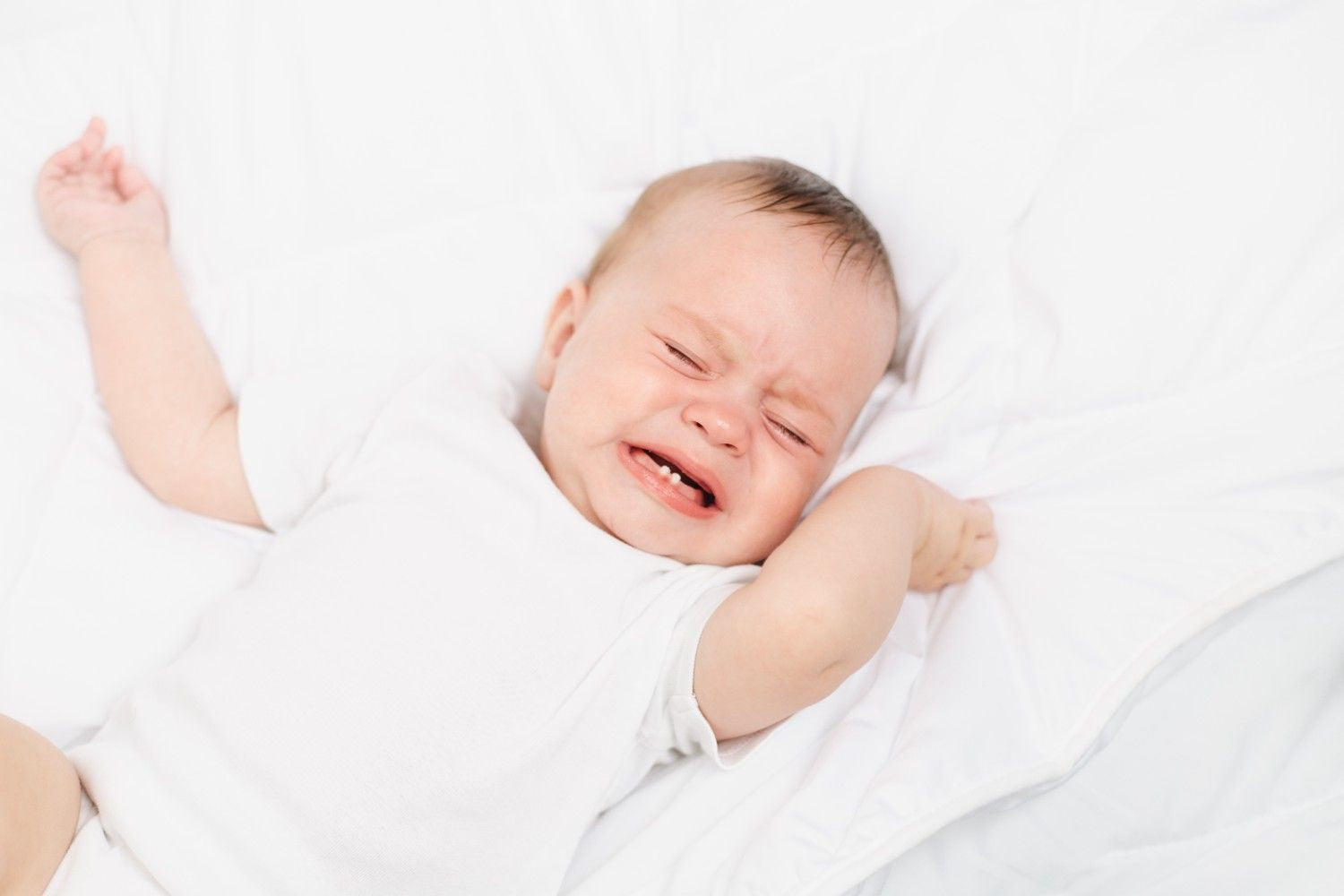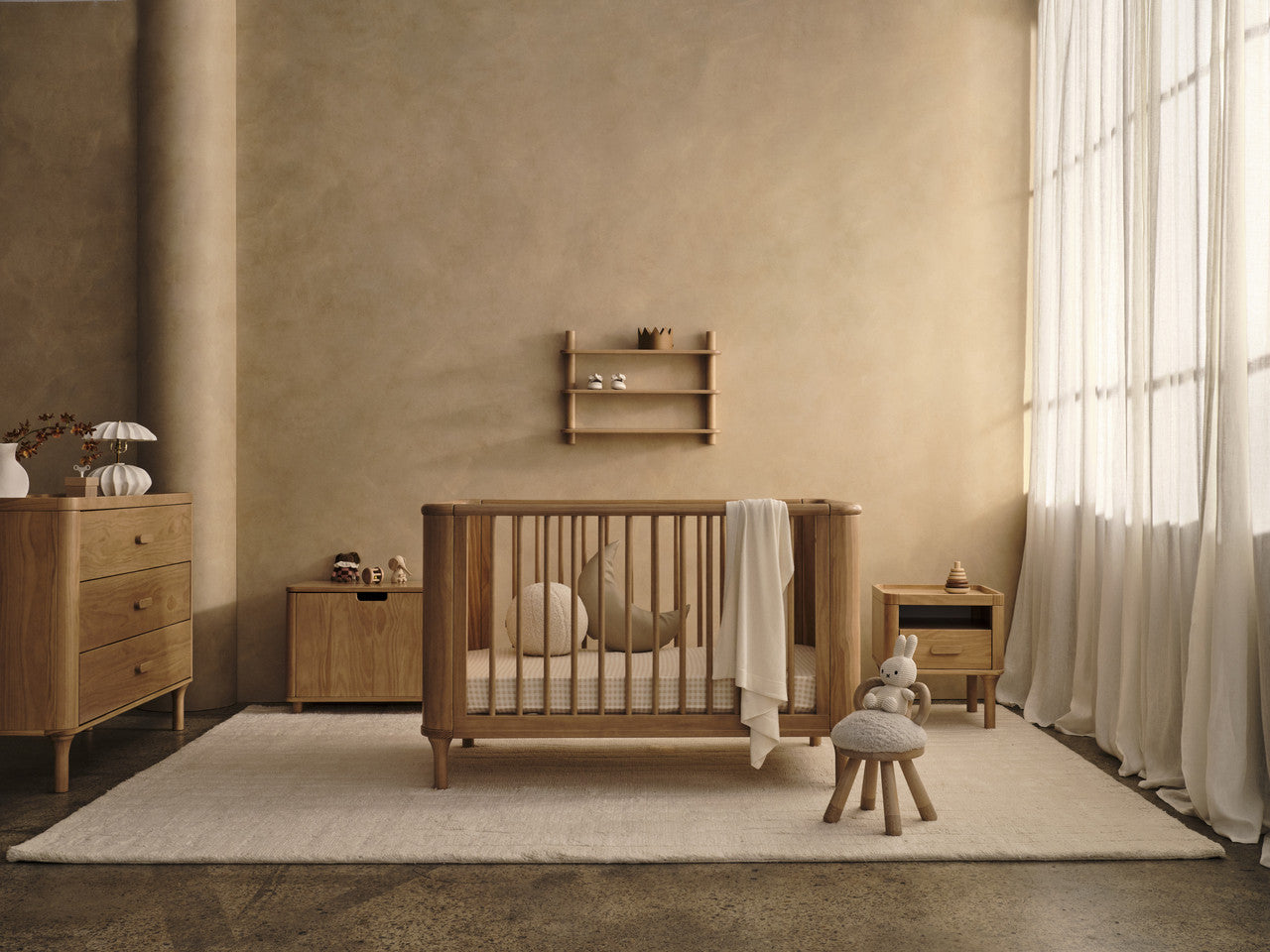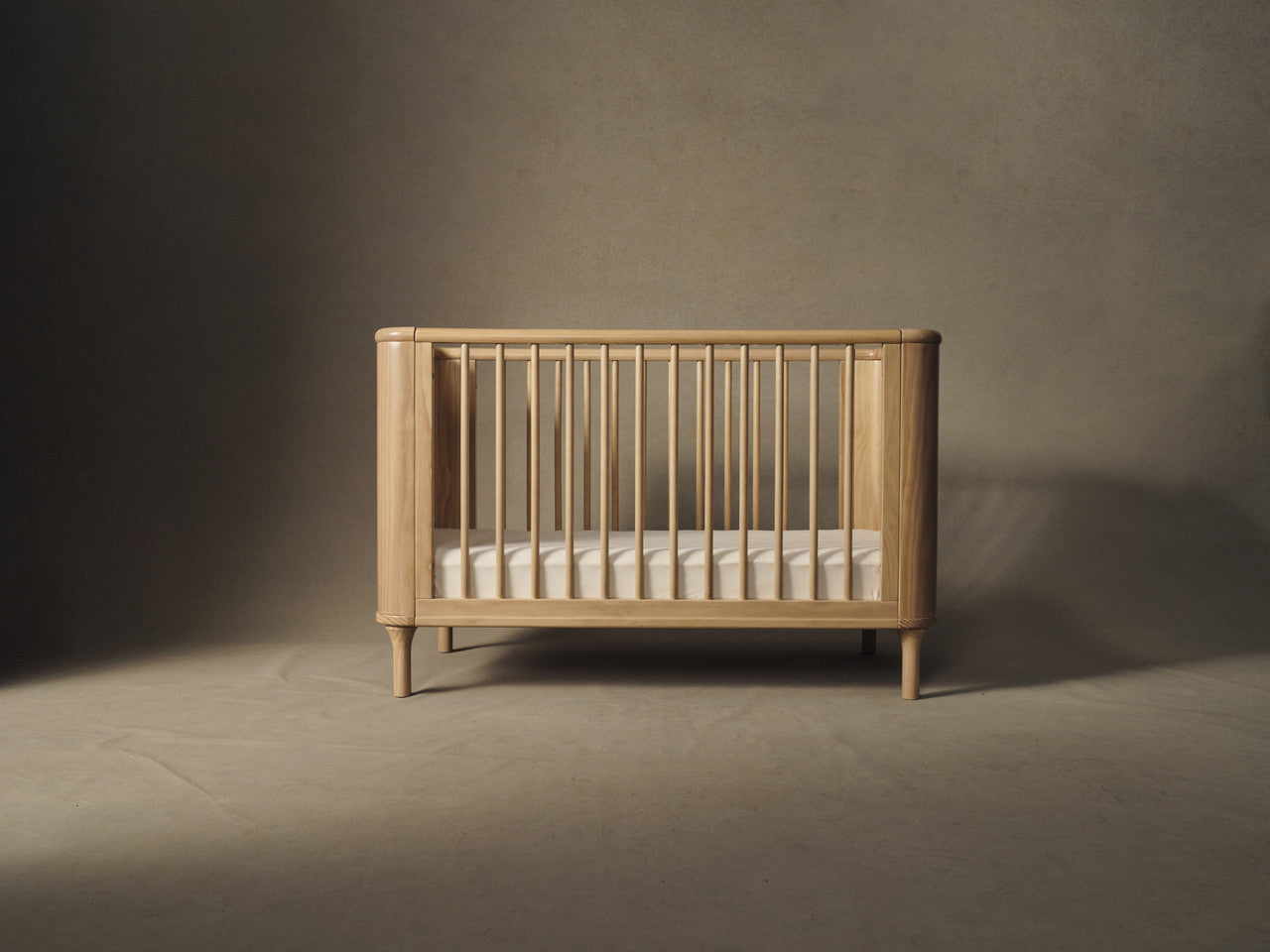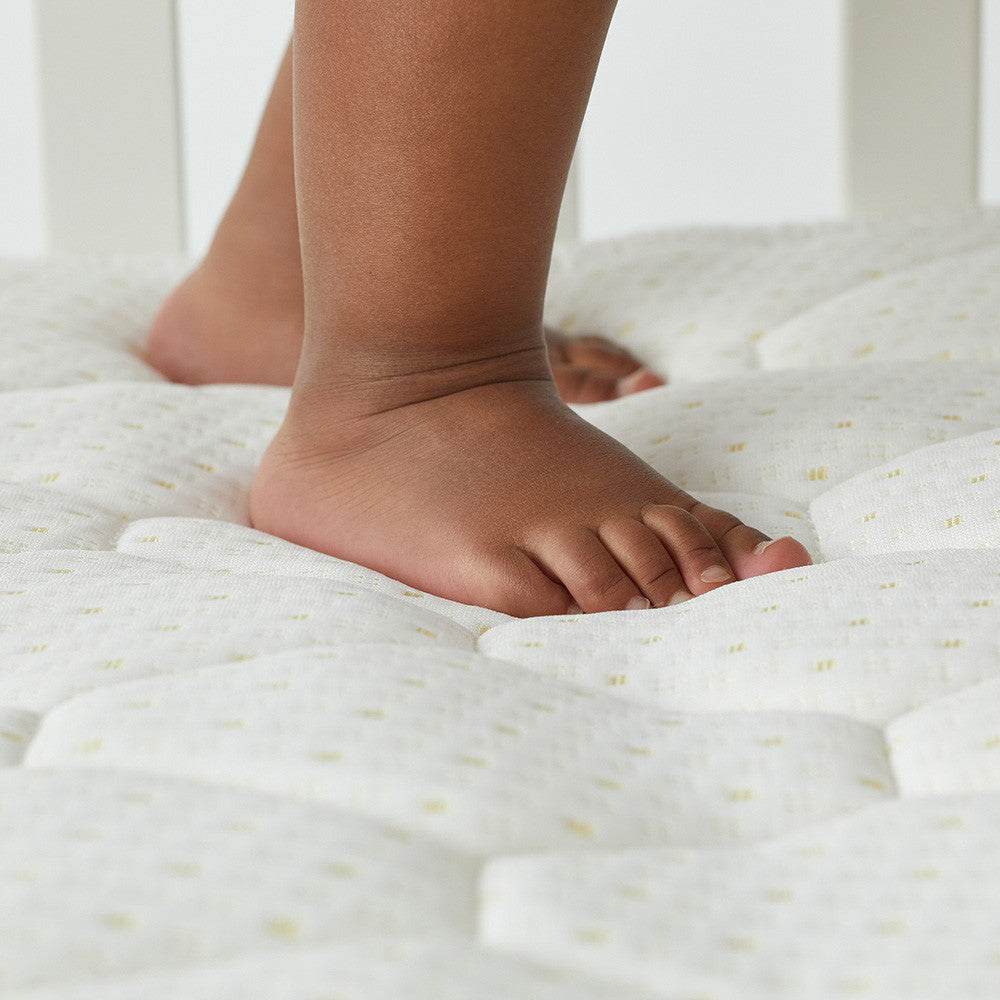If you’ve ever gone to check on your baby when you’ve heard crying, only to find them somehow still fast asleep in their cot, then you might have wondered what’s going on.
Moreover, how do you comfort a crying baby who is still sleeping?
Are they hungry?
Should you wake them up?
It’s relatively uncommon for babies to cry in their sleep, but it’s not unheard of, and in most cases, it’s nothing to be worried about.
Still, you’re probably wondering—why is my baby crying in his sleep?
Let’s take a look at why do babies cry in sleep, what might be causing it, what’s normal, and when to worry.
Why do babies cry in their sleep?
When a baby cries in sleep, it can be caused by a number of factors.
One of your first thoughts might be nightmares, but studies suggest that children don’t start having nightmares until around two years old.
So, it’s not being caused by nightmares—but what is causing it? There are a couple of possible causes.
First, a baby’s sleep cycle lasts for around 40 minutes, and when moving from one cycle to another, they may experience a period of unsettlement which might lead to crying.
Additionally, overtiredness which has caused some big crying before sleep, may carry over to sleeping. Finally, teething can cause crying in sleep.
It’s also worth remembering that since babies can’t talk, crying is their only form of communication.
In some cases, crying in their sleep might just be their version of sleep talking.
Understanding baby sleep patterns
Infants sleep in cycles, just like we do.
However, for little ones, these cycles are happening much faster than for an adult sleeping 7-9 hours a night.
Within a sleep of just a few hours, a baby will rapidly move from REM (active sleep) into deep sleep.
These sleep patterns change quickly as little ones grow, which means that a baby crying in sleep at 6 months can have a different cause and solution than a baby crying in sleep at 4 months.
At 4 months, babies are often adjusting to a major developmental shift called the 4-month sleep regression.
Their sleep cycles become more like those of adults, and they start waking more frequently.
Crying during sleep at this stage is often linked to overtiredness or difficulty transitioning between sleep stages.
By 6 months, many infants are more aware of their surroundings and may begin experiencing separation anxiety or reacting to disruptions in routine, teething, or changes in their nap schedule.
Newborn vs older baby sleep cycles
|
Sleep feature |
Newborn (0–2 months) | 4-Month-Old | 6-Month-Old |
|
Sleep cycle length |
~40–50 minutes |
~50–60 minutes | ~60–90 minutes |
| REM (Active Sleep) | About 50% of sleep cycle | About 40% | About 25–30% |
| Sleep structure | Mostly light and active sleep, short bursts | Begins to form more adult-like sleep stages | More deep sleep, longer and more consolidated stretches |
| Day/Night Awareness | None — sleeps around the clock | Beginning to recognise day vs night | Clearer day/night pattern, especially with consistent routine |
| Sleep Duration (24 hrs) | 14–17 hours (fragmented across day and night) | 13–16 hours (slightly more consolidated) | 12–15 hours (often with longer night sleep) |
| Night Wakings | Very frequent (every 2–4 hrs for feeding) | Still common, but may begin stretching sleep longer | Many babies sleep longer, but some still wake for feeds |
| Naps | Short and irregular (20–40 mins) | More regular (2–4 naps/day, around 30–60 mins) | 2–3 solid naps/day (30–90+ mins each) |
| Movements & Noises | Lots of movement, grunting, and crying in REM-heavy sleep | Movements may reduce slightly | Quieter during sleep as deep sleep increases |
| Can Sleep Through the Night? | Not developmentally expected | Some may begin to consolidate night sleep | Some babies can sleep through, but it still varies widely |
| Common Sleep Behaviours | Frequent waking, noisy sleep, needs help settling | Light sleep, more aware of surroundings, possible regression | Separation anxiety, teething, or disruptions can affect sleep |
| Why They Might Cry in Sleep | Hunger, gas, startle reflex, transitioning sleep stages | Sleep regression, overstimulation, trouble self-settling | Teething, overtiredness, separation anxiety, habit waking |
Is crying during sleep normal?
A baby randomly crying in sleep might seem strange, but it’s not abnormal, and in most cases, it’s nothing to worry about.
During the lighter phases of sleep, especially active (REM) sleep, it’s very common for babies to stir, grunt, whimper, or even let out a full-blown cry.
In newborns, sleep is especially unpredictable. Their brains are still developing, and they spend a lot of time in REM sleep, which can involve twitching, facial expressions, and crying sounds.
As they grow, these sleep noises usually settle down.
Common reasons your baby cries in sleep
These are the main reasons that might explain why a baby is crying in sleep :
1. Light sleep : Babies spend a lot of time in REM, especially in the early months. During this stage, they might twitch, grunt, whimper, or cry out, but it’s often just their brain processing the day. This is one of the most common reasons why babies cry in their sleep then stop.
2. Startle reflex : Newborns can suddenly jolt themselves awake with their arms flinging out, which can lead to a cry even while they’re still half-asleep. Swaddling can sometimes help.
3. Gas or tummy discomfort : Wind pain or reflux can be uncomfortable and may cause your baby to cry out mid-sleep, especially if they’ve just fed.
4. Overtiredness : When babies are too tired, they can struggle to settle into deep sleep and may cry or fuss in their sleep.
5. Teething : If your baby is teething, the discomfort doesn’t stop just because they’re asleep, and very sore gums can lead to restless sleep.
6. Sleep regression or developmental leap : Around 4 months and at other stages, your baby’s brain goes through big changes that can disrupt sleep. Crying during sleep is often part of the mix.
What’s normal and when to worry
If your baby cries out but settles quickly and seems calm when you check on them, it’s likely just part of their sleep rhythm.
However, if the crying continues, they seem upset, or you suspect they’re hungry, uncomfortable, or unwell, then they might need you. Trust your instincts.
That being said, you should reach out to your paediatrician if :
- The crying is intense, persistent, or high-pitched, especially if it doesn’t stop after a few minutes or seems to happen every time they sleep
- Your baby seems in pain—arching their back, clenching fists, or pulling their legs up to their tummy (which could suggest gas or reflux)
- They’re waking frequently and struggling to settle, even when held, fed, or comforted
- There are other symptoms, like a fever, rash, vomiting, or a change in feeding or nappies
- You just have a gut feeling something’s not right—your instincts are important, and you know your baby best
If your baby is otherwise healthy, feeding well, gaining weight, and has periods of calm and contentment during the day, then a few night-time cries are likely just part of their normal development.
Tips to comfort your baby and improve sleep
If your baby is crying in their sleep, it can be hard to know whether to step in or let them settle.
Sometimes, they’re not fully awake, just moving through a lighter sleep stage, and they may settle on their own.
But if they seem upset, here are a few ways to comfort them :
- Pause and listen : Give it a moment before rushing in. Your baby might just be whimpering in their sleep and may not need anything at all. Many babies will resettle on their own if given a bit of time.
- Gentle touch : If they’re still fussing, try placing your hand gently on their chest or tummy. A soft pat or slow rub can be soothing without fully waking them.
- Check that the room is comfortable : Make sure the room is dark, quiet, and not too warm or cold. If something is off then that might explain why baby is crying.
-
Swaddle (for younger babies) : If your baby is under 3–4 months and still enjoys being swaddled, wrapping them safely can help reduce crying in sleep, if caused from the startle reflex.
How to help a crying baby fall asleep
Newborn babies cry for around two hours in a 24-hour period during the first six weeks.
It goes without saying that this can be exhausting for everyone involved, and if you expected to have a break when your little one goes to sleep, only to find they cry in their sleep too, this can be frustrating.
In many cases, your baby may be able to sleep through their own crying—but that doesn’t mean you will. If there are two parents, consider taking turns so that everyone is getting a break.
If baby crying in sleep is becoming a regular occurrence, or if you sense baby is getting overtired, try condensing the usual bedtime routine (which shouldn’t be longer than 10 minutes for newborns anyway).
It’s okay to skip some of the steps if it means getting an overtired baby to bed faster.
Even if baby is fed, breastfeeding parents might consider comfort nursing. This is soothing for baby, and lets them know they’re safe, and it’s okay to sleep.
Finally, make sure your baby has a comfortable sleep environment.
Tasman Eco is a leading supplier of nursery furniture Australia. We began as a family business and have continued to grow.
Today, we consider ourselves experts on all things baby. From our range of baby bassinets to answering all your parenting questions, like how to start baby led weaning, when to transition from a pram bassinet to a seat, and, of course, what to do if your baby is crying in their sleep.
With over 30 years in the industry, we’ve helped more than a million Australian parents create safe, comfortable spaces for their little ones.
If you’re looking to upgrade your nursery and ensure a calming sleep environment, consider Tasman Eco—one of Australia’s most trusted names in nursery furniture and mattresses.
Frequently asked questions
1. Why do babies wake up crying in the middle of their sleep?
Babies often wake up crying in the middle of their sleep because they’re still learning how to transition between sleep cycles.
Their sleep is also lighter and more fragmented than adults’, especially in the first few months.
So when they stir between cycles, they might not know how to settle themselves back to sleep.
They may also be crying out because they need something, whether that’s milk, a change, or hunger.
Overstimulation and overtiredness can also be a factor, as well as developmental changes.
If your baby is learning to crawl or roll, this is likely to lead to disrupted sleep as their brains are working harder than usual to master this new skill.
2. What does a neuro cry sound like?
A neuro cry is a type of cry that can sound different from your baby’s usual crying and may be a sign that something more serious is going on.
A neuro cry is often described as very high-pitched, sharp, or piercing, almost like a screech.
On the other hand, a neuro cry can also be weak and hard to hear. Unlike regular crying, it might not stop with cuddles, feeding, or soothing, and can seem constant or come on suddenly without a clear reason.
If your baby’s cry sounds unusual to you (and remember, you are the best judge of this), and is paired with things like poor feeding, stiffness, or a baby that seems very sleepy or hard to wake, it’s important to check in with your doctor.
3. How to tell the difference between active sleep and crying?
Here’s a quick overview of the main differences, and how you can tell them apart :
| Active Sleep | Crying | |
|---|---|---|
| Sound | Soft grunts, whimpers, brief cries | Loud, intense, persistent crying |
| Eyes | Closed with fluttering or rolling | Open or open soon after crying starts |
| Body Movement | Gentle limb movements, sucking motions | Restless, flailing, arching back |
| Breathing | Irregular but calm | Rapid or distressed |
| Duration | Short bursts, settles quickly | Lasts longer, won’t stop on its own |
| Response to soothing | Usually settles without intervention | Needs comfort like feeding or cuddles |
4. How to stop baby crying in sleep?
The answer often lies before the sleep starts. It can be hard, especially for sleep deprived parents, but try not to think about stopping the crying as much as setting up for future success.
Focus on creating a calm, consistent bedtime routine that helps your baby feel safe and relaxed.
Make sure their sleep environment is comfortable (quiet, dim, and at the right temperature).
Finally, if they do wake, offer comfort without rushing to pick them up every time, so they can learn to self-soothe. Over time, these habits can help reduce crying during sleep.
5. Why does my teething baby cry in his sleep?
It’s pretty uncomfortable growing teeth, and more crying is a normal part of the process.
Their gums can feel sore, swollen, or itchy, and they’re likely to fuss. The pain can be worse when they lie flat, as blood flow increases to the head and gums.
Plus, teething can make some babies feel generally unsettled, which can affect how deeply they sleep or how easily they wake.
If your baby is otherwise well, offer them a cuddle, a teething ring, or a cool washcloth.
6. At what age do babies cry the most?
In the first few months, it’s completely normal for babies to cry anywhere from 1 to 3 hours a day, sometimes more, especially during the peak crying age around 6 to 8 weeks.
This crying might be spaced out through the day or happen in longer stretches, often in the late afternoon or evening.
By around 3 to 4 months, most babies start to settle and cry less as their sleep patterns and routines become more predictable.







Share:
Are Cot Bumpers Safe?
Thread Count Sheets - What You Need to Know